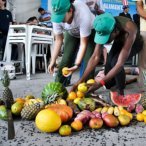English · Español

18 de junio de 2012 | Videos | Anti-neoliberalismo | Soberanía Alimentaria
Moving Towards a Political Agreement
Peoples’ Summit Inaugurates Convergence Plenaries
Descargar: MP3 (2.6 MB)
The convergence plenaries began to session on Sunday at the Peoples’ Summit in Rio de Janeiro, Brazil, with thousands of participants. There are five plenaries in total in the area called “Aterro do Flamengo” that will provide the key elements to come up with a final declaration for the summit.
The five thematic areas include: food sovereignty, energy and extractive industries, defending common goods from commodification, rights, social and environmental justice, work: for another economy and new paradigms.
The plenaries took place on Sunday and will continue throughout Monday. The aim is to trigger a discussion around these issues between different actors. Social movements and organizations that have promoted the Peoples’ Summit highlight that these plenaries aim to reach political agreement, common messages that will mobilize people and will be a response to the advance of ’green economy’, the main issue at the United Nations conference Rio+20.
Real World Radio covered the plenary sessions on food sovereignty and the defense of common goods. Karin Nansen, of Friends of the Earth International, Diego Monton, of La Via Campesina and Nalu Faria, of the World March of Women Brazil were the speakers at the plenary session on food sovereignty.
Nansen is a member of REDES-Friends of the Earth Uruguay. She explained that ’green economy’ “is a political project, a political agenda to pave the way for a new era of capital accumulation, of accumulation of our territories, of appropriation of nature and reorganization of social relations”.
She pointed out that many actors seek to impose the idea that the different (economic, food, energy) crises are a result of “a market failure” for not having put a price on nature. “Once again, they want to impose market as a solution to all problems”.
“We say NO”, she emphasized. “Nature and food have a value different from their market value, it is a value linked with our culture, our livelihood, our relations, it is not linked with capital accumulation”.
Meanwhile, Diego Monton said the struggles in Latin American countries are focused in the rural areas against problems such as peasant evictions, agrotoxics, megamining, dams and slave work. “We have many struggles. The challenge is to be able to coordinate, to unite and organize all these struggles to tackle the actual cause of all these problems: capitalism, expressed in the rule of banks”.
The activist of the Indigenous Peasant Movement of Argentina said food sovereignty will not be possible within capitalism or ’green economy’, which is “a strategy of the financial capital”. “Food sovereignty will be possible within a different social and economic model”, said Monton, who called for the unity of workers, peasants, native peoples and fisherfolk.
Nalu Faria said that “in order to talk about food sovereignty and our proposals to tackle the crises, we need to consider that being a man is different from being a woman, and that we face different problems in different parts of the world and different parts within a country”. “Unless we bear that in mind we will not be able to transform the world, nor to confront green capitalism”.
The representative of the World March of Women said men and women are not equal “because our society is structured based on different forms of oppression”, including oppression of women. “Capitalism gets the most of this oppression”. Faria believes the alternatives lie on “another production and consumption model, another model of society and economy based on the well-being of all” instead of on profit. In order to have a new model we need to live in harmony with nature and “rethink the way we divide labor among men and women”.
Photo: Radio Mundo Real








